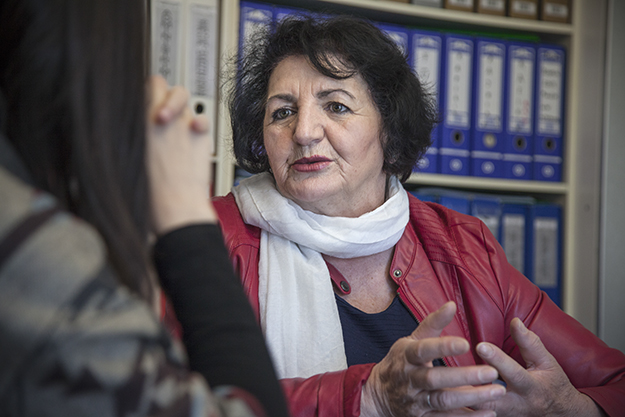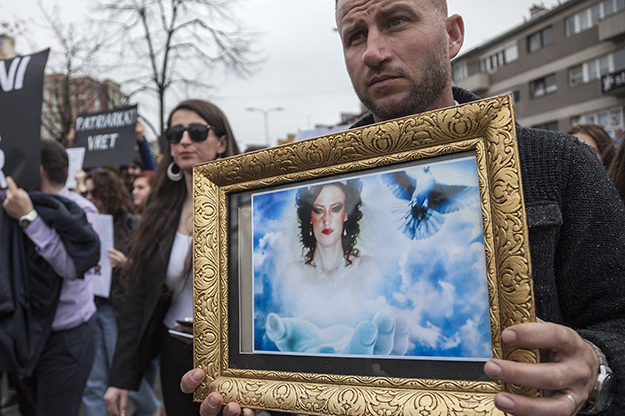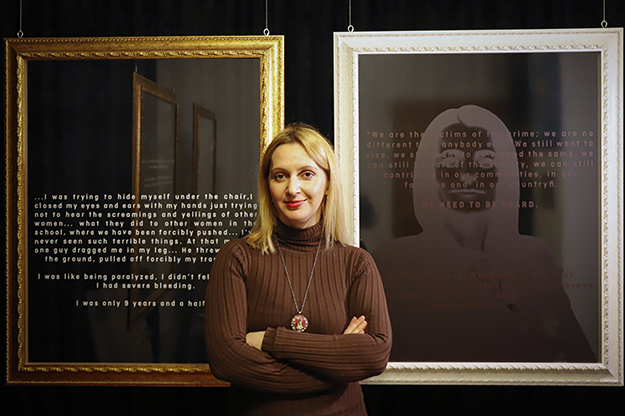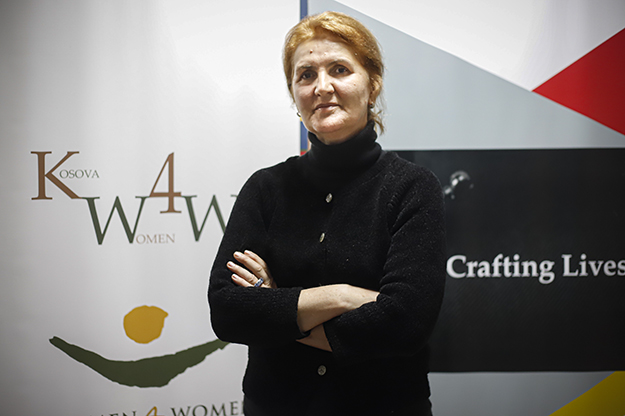On a fresh afternoon in August, a young woman in her late 20s enters the meeting room of the Safe House in Gjakova. She’s skinny, and wears a sporty blouse which covers her five month pregnancy. This is her third time in the shelter for survivors of domestic violence in the last five years, as she has come to escape the violence and torture from her 32-year-old husband, with whom she has a 4-year-old daughter.
“The last time he beat me, my face was all messed up. He hit me with anything he could,” she says, pointing to the right side of her face before explaining how after the attack she rested that side of her face on the pillow for nights on end.
“But luckily the baby survived, because that night I was covered in blood,” she says of the events in the spring with a stern voice and look.
This, she says, was the moment that made her decide to leave him for good.
Because of the severity of the case, the police immediately took her husband into custody, but the court only gave him a six month sentence, and he was expected to be released in November.
A 33-year-old woman from Deçan enters. She has an attractive face, although she is noticeably exhausted.
“He tried to do everything to me. He tried to stab me, he kicked me out… all winter I slept outside. He tried to burn me with petrol. He even tried to put my head in the oven,” she says, explaining the physical and emotional violence she endures from her husband, whom she married as a 16-year-old, without the approval of her family.
“And my hair… it was long all the way to here,” she says, touching the middle of her back. “But it fell out. He pulled my hair out. For five months I had no hair.”
A 32-year-old, a mother of five from the Dukagjini region, recounts her own experience:
“I’ll never forget that night in my life,” she says of the decisive night in her 17 years of violent marriage. “He took me to some mountain. It was half past midnight. There was no light, no houses, nothing. I didn’t know where to go, what to do.”
Having been constantly accused of cheating by her husband, she says she feared for her life that night.
But when I ask whether there was any time when they didn’t want to have sex but were forced to, the response is different.
After leaving her in the mountains for 20 minutes, he returned and told her: “No, I won’t leave you. You’ll find your way to the road, find your way and return home again. I’m gonna find a place where you can’t escape, so something can eat you. Then there will be no evidence that I killed you.”
She refused to enter the car, so he dragged her and threw her into the car. She still has scratches on her arms.
“‘You have no choice, because I’ll kill you — I’m gonna skin you with a knife, bit by bit,’” she recalls him saying, adding that she was convinced he would do it.
“Did he sexually abuse you?” I ask each of them, and each swiftly responds: “No.”
But when I ask whether there was any time when they didn’t want to have sex but were forced to, the response is different.
“I never wanted to,” says the woman from Deçan. “But I didn’t dare say it.”
The mother of five also has a different answer when she’s asked this question. She speaks about what has been her most difficult moment.
“I had kidney surgery four months ago,” she says. “I had kidney stones and the surgery was very complicated. Even my urinary tract was open.”
When she told her husband that she had been told by her doctor that she couldn’t have sex due to the surgery, he asked her: “Who did you do it with, since you can’t do it with me?”
Meanwhile, the pregnant woman says that if she told her husband “No,” he would beat her.
“He wanted his pleasure,” she says. “He just did it, even if I was crying and telling him that I didn’t want to. I was forced, and I had to do it because there was no alternative.”
Sexual violence from a spouse, cohabitant or partner is a form of violence that is recognized as a penal crime in many countries around the region and the world. It is internationally recognized with the legal term “marital/spousal rape.”
In Kosovo there is very little information and awareness about this form of violence against women. It remains one of the most difficult issues that women experience and that they are hesitant to speak out against. Or to seek institutional and social support for it.
Institutional approach to marital rape
Until now, domestic sexual abuse has been dealt with by referring to the Law on Protection Against Domestic Violence, the Law on Gender Equality, the Criminal Code and other legal provisions that are based on international conventions and are enshrined in the Constitution. Although there has been no clear legal basis for specifically addressing marital sexual violence, there have still been sufficient legal elements to address it.
For example, the Law on Protection Against Domestic Violence includes “non-consensual acts and sexual ill-treatment” in its definition of “domestic violence” as a category that is related to sexual violence in marriage. Article 230 of the Criminal Code refers to “degradation of sexual integrity.”
Meanwhile, Article 3 of the Law on Gender Equality, defines gender-based violence as “all acts of violence that result in, or are likely to result in, physical, sexual, psychological, social or economic harm or suffering on the grounds of gender, including threats of such acts, coercion or arbitrary deprivation of liberty, whether occurring in public or in private life.”
But the key issue that remains is that this form of violence against women is not reported to institutions.
“We [women] are ashamed to point [sexual violence] out in court,” says the pregnant woman from Gjakova municipality. “In most cases, we don’t mention it at all.”
Sakibe Doli, a counselor for domestic violence victims and former director of the Safe House — where she worked for 19 years — says that in all her years of experience working with domestic violence victims, women have mainly admitted to experiencing physical and mental violence from their husbands.

Sakibe Doli, with 19 years experience of helping domestic violence victims, says that many women report only physical violence and not marital rape. Photo: Majlinda Hoxha / K2.0.
According to Doli, of the approximately 1,000 women and girls that have been sheltered at the Safe House in the last 19 years, only five have openly talked about the sexual violence that they endured from their husbands. She mentions the case of a 49-year-old woman, a mother of three adults, who was raped and sexually tortured by her husband with different objects.
“The methods that her husband used are terrifying, inconceivable,” she says. “She suffered a lot and that is why she spoke about that form of violence.”
But according to Doli, the woman in question only spoke about her experiences when within the shelter. In court, she only reported “physical violence,” and as a result her husband was kept in custody but then eventually released.
Lawyer Saranda Keqekolla-Sadiku says that in her eight years of defending victims as part of the State Prosecution, she has worked with many women who have experienced sexual violence from their husbands or partners. But according to her, they never want to report it. They simply want it to stop. She says they haven’t wanted to report it because of their fear of “ruining the family.”
Keqekolla-Sadiku highlights the one case in her whole career to date when a woman reported that she had been raped by her husband.
“It was a woman from the Serb community. She was pregnant and was told by her doctor not to have sex, because it would put her pregnancy at risk,” she says. “But despite this, he forced her to have sex with him.”
K2.0 contacted Kosovo Police to request official data on sexual violence in marriage. However, they were only able to provide data about domestic violence.
Sexual violence from a spouse or intimate partner is not listed as a unique category, and data about categories that should include marital rape are almost completely nonexistent. In 2018, only three cases of rape were reported, while in 2017 there were no reported cases, and in 2016 there was just one.
As for the category of “degradation of sexual integrity,” there were no reported cases in the last three years.
Moreover, K2.0 received statistical data from Kosovo Judicial Council about “criminal offenses against sexual integrity,” but it is difficult to determine whether or not the cases received from Basic Courts include sexual violence from a spouse or partner.
One of the factors that influences women not to report marital rape is the often sexist approach of police officers and judges, and the way they deal with the few cases that are reported by women.
Her husband broke her hand, split her head open with a glass and shaved her head bald, but she says that the sexual violence was the most difficult to endure.
A 34-year-old woman, another mother of five, who was sheltered at the Center for the Protection of Women in Peja, says her partner had a second “wife” — likely not through an official marriage — in their home, and he forced them to perform sexual acts that he had seen in pornographic films.
“He wanted to have a threesome, with another woman,” she says. “But I couldn’t. I didn’t like it. But he would force me.”
The woman says her husband broke her hand, split her head open with a glass and shaved her head bald, but that the sexual violence was the most difficult to endure. According to her, although the police took her to the shelter due to the clear signs of physical violence, they didn’t care about the sexual violence she told them about, and they did not file an indictment against her husband.
“Our institutions are not active, because in essence they are not pro-victim — they do not have a pro-victim approach,” says psychologist Eliza Shporta, who has been working on victim rights protection for the Department of Justice at the U.S. Embassy in Prishtina for seven years.
According to Shporta, many prosecutors and judges, with whom she has worked in training programs, accept physical violence as a genuine form of violence. But, she says that they need to understand and accept “domestic violence” as a term first, so that they can deal with its forms properly at an institutional level.
The case of Antigona Morina brought to attention the occurrence of marital rape and the institutional inefficiency in dealing with these cases.
The 29-year-old from the village of Radoc in the municipality of Rahovec died three days after getting married in 2012, as a result of continuous hemorrhaging. According to different accounts, her husband, Hilmi Zena, continued to have forced sexual intercourse with her despite the fact that she was bleeding heavily from her genital area, and he did not take her to see a doctor despite her condition.
“Antigona Morina is a concrete case of marital rape,” says activist Adelina Berisha from the Kosovo Women’s Network.
However, the Basic Court of Gjakova used the Criminal Code to classify the case in question as a “violation of family obligations” and only found her husband guilty of “not providing medical aid” on the second day when she was suffering from the hemorrhage.

On March 8, 2019, the brother of Antigona Morina joined the women’s protest, where different forms of domestic and gender-based violence were raised. Photo: Majlinda Hoxha / K2.0.
“A violation of a family obligation is failing to give his wife two euros to buy menstrual pads,” Berisha says. “It is not when you rape your wife to death.”
Kosovo Women’s Network’s monitoring and discussions with legal officials, reinforces the evidence that there is a prevailing patriarchal mentality among many judges, prosecutors and police officers. Sexual intercourse in marriage is often seen as an obligation of a wife toward her husband.
“Very few of them understand sexual violence in marriage as a form of violence,” Berisha says.
In March 2018, Kosovo Women’s Network organized a protest called “Justice for Antigona” and engaged attorney Fehmije Gashi Bytyqi to represent her family after the Court of Appeals ordered a retrial. The efforts resulted in a minimal sentence of two years for Zena.
The relatively short sentence was not welcomed by the NGOs who fought for justice in her name. Moreover, in most cases NGOs remain the only safe spaces where the testimonies of women who have survived different forms of violence are heard.
There has been a similar situation with the survivors of wartime sexual violence. After the end of the war, it took 18 years for society to begin addressing the topic of wartime rape with dignity. This only happened in earnest after Vasfije Krasniqi Goodman spoke publicly about her experience of surviving sexual violence as a minor during the war in October 2018.
But for many women who survived wartime violence, the sexual abuse didn’t end there.
On live national television, she told the Kosovar public how she had been taken from her home in the village of Stanoc i Ulët in Vushtrri by a Serb in uniform in April 1999. She was then raped in two different locations in Babimoc village by two different people.
Her story elicited sympathy from the Kosovar audience, and the debate over legal recognition of wartime sexual violence survivors intensified. Vasfije was awarded a presidential medal, and with the initiative of former President Atifete Jahjaga, she shared her story before the United States Congress.
But for many women who survived wartime violence, the sexual abuse didn’t end there.
Drawing from her 12 years of experience working with victims of wartime sexual violence, Selvi Izeti from the Kosova Rehabilitation Centre for Torture Victims says that marital rape is also quite prevalent among survivors of wartime sexual violence.
According to her, many men are traumatized by the fact that their wives are victims of wartime sexual violence. As a result, they often inflict physical, mental and sexual abuse.
“‘I feel absolutely nothing. I stay there like I’m frozen. But I don’t reject my husband, so there are no consequences,’” Izeti recalls a wartime sexual violence survivor having told her. “Sexual intercourse incites trauma among survivors.”

Selvi Izeti from the Kosova Rehabilitation Centre for Torture Victims says that survivors of sexual violence during the war are often subjected to marital abuse, including rape. Photo: Fikret Ahmeti.
She explains that for this reason many survivors try to avoid having sex with their husbands. But they submit to them even when they have no desire to have sex, just so they don’t notice this lack of will and readiness to engage in sexual intercourse so as to avoid complaints and debates.
Izeti highlights an extreme case to illustrate the forms of abuse that these women continue to face.
“A man forces his wife to go out to buy cigarettes for him during the war because he is afraid to go out himself,” she says. “His wife is caught by Serbian forces and returns home completely naked. In the first few days, he tries to support her, but then starts to get violent with her. Even after having kids together and being married for many years, he continues to throw accusations at his wife, saying that his children are Serbs.”
Expectations for the new Criminal Code
Marital rape is explicitly recognized as a criminal offense in many developed democratic countries. In the U.S., marital rape was criminalized in 1993 in all states. Similarly, in many countries in Europe this form of violence is recognized as a criminal offense. In France, marital rape was criminalized in 1992, while in Germany it happened in 1997.
The Council of Europe Convention on Preventing and Combating Violence against Women and Domestic Violence, known as the Istanbul Convention, signed by all EU member states and ratified by 21 of them, calls for the criminalization of rape and all other non-consensual sexual acts.
In the recommendations of the Committee of Ministers of the Council of Europe, the focus is on punishing not only non-consensual sexual acts, but also cases where the victim doesn’t resist. The Parliamentary Assembly of the Council of Europe refers to Resolution 1691 against the rape of women, including marital rape, highlighting rape as a serious crime.
“We have noted a tendency to somehow avoid sexual violence among the groups who have drafted laws. I don’t know why this is.”
Naim Qelaj, Ministry of Justice
Marital rape is also defined as a specific criminal offense within the region. In both Serbia and Montenegro, this form of violence is explicitly criminalized through special articles that refer to the criminal offense of “rape” or other relevant categories.
In Albania, marital rape is penalized by five to 15 years imprisonment. Through Article 102 of Albania’s Criminal Code it is defined as “engagement in sexual activity by use of force with adult females or between spouses or cohabitants, without the consent of either of them.”
In Kosovo, the new Criminal Code, which entered into force in April 2019, now recognizes sexual violence as one of various potential forms of the criminal act of domestic violence. Legal experts and civil society activists consider this development an important step toward the legal punishment of domestic sexual violence.
“We have noted a tendency to somehow avoid sexual violence among the groups who have drafted laws. I don’t know why this is,” says Naim Qelaj, national coordinator against domestic violence within the Ministry of Justice.
But according to Qelaj, the fact that domestic violence is now classified as a criminal offense in the Criminal Code and relevant laws is thanks to women lobbyists and the insistence of organizations, agencies and individuals within institutions.
“Initially, they attempted to define domestic violence as physical, psychological and economic abuse,” he says. “But we managed to broaden the definition to include sexual violence as well.”
Shporta notes that the new Criminal Code is very good because it provides a clear basis for protecting victims of domestic sexual violence.
She explains that article 248 of the Criminal Code, which addresses domestic violence, refers to the Law on Protection Against Domestic Violence. This law clearly classifies domestic sexual violence as a criminal offense, when it is done without consent. Moreover, she says that Article 227 of the Criminal Code, which addresses rape, makes it clear that the perpetrator can “have family ties with the victim.”
Sakibe Doli hopes that with the criminalization of sexual violence through the new Criminal Code and the inclusion of sexual violence as one of the forms of domestic violence, the focus of the debate will turn to this form of violence and will lead to trainings with institutional officials, legal experts and members of civil society.
But despite the important step of criminalizing domestic sexual violence through the new Criminal Code, Qelaj notes that Kosovo is lacking mechanisms for implementing laws.
“We do not empower the institutions that would implement the law in accordance with the demands that stem from the law,” he says.
According to Qelaj, Social Work Centers are concrete examples of this kind of negligence.
“The Social Work Center must also visit victims' violent families and take concrete steps toward the rehabilitation of the victim, the children as witnesses of violence, and the violent husband.”
Lumturije Ibra, Center for the Protection of Women (Peja)
Social Work Centers, which are financed by municipalities, are obliged to provide social care and counseling for citizens who have no support from their families or the community, who feel endangered or neglected, exploited, abused or threatened by others. According to the obligations that stem from the Law on Social and Family Services, the centers must keep a registry of people in need who reside near them, and must visit them regularly to check on their safety and welfare.
But Lumturije Ibra, coordinator at the Center for the Protection of Women in Peja, says that despite what the law dictates, the Social Work Center in Peja did not act in the case of sexual violence experienced by the 34-year-old mother of five who found refuge at the Peja shelter.
“The Social Work Center is not only obliged to visit victims who are accommodated at the shelter, but must also visit their violent families and take concrete steps toward the rehabilitation of the victim, the children as witnesses of violence, and the violent husband,” she says.
A monitoring report about the institutional response toward gender-based violence in Kosovo, published by Kosovo Women’s Network in 2017, says that Social Work Centers, the basic role of which is to support and empower survivors, are a failure. The report says that these centers receive insufficient funds from municipalities, and that staff are unqualified to deal with domestic violence cases. Some of the staff are not familiar with Kosovo’s National Strategy and Action Plan Against Domestic Violence 2016-2020.
Moreover, the report in question says that the shortage of funds influences the quality and seriousness of the work of Social Work Centers.
‘Rehabilitation’ of perpetrators of violence
Beginning to effectively deal with the issue of sexual violence in general, and specifically marital rape, will require a societal shift in attitudes.
Under an article about the murder of a 32-year-old Kosovar woman who was stabbed to death by her husband in Germany in August, one man commented on Facebook: “One less slut in the world.” The husband also killed a 23-year-old man from Afghanistan, who was reported to have been the partner of the victim.
“For thieves and sluts, the blood goes to waste,” commented another under an article about the murder of a 31-year-old woman who was shot 15 times by her 60-year-old husband in Gjilan in July.
“If she cheated on him, it’s a pity that he didn’t shoot her a hundred times in the stomach,” wrote another.
Such comments are often seen or heard in different public spaces. And local institutions have not taken any concrete measures to challenge this victim-blaming mentality.
“We must work with abusers, and this work should be an essential component of efforts to eliminate violence against women.”
Sakibe Doli, domestic violence counselor
Since the end of the war in 1999, there have also been no institutional programs for abusers. For the first time, the Safe House in Gjakova recently undertook a small 10-month project to work with domestic abusers.
“We must work with abusers, and this work should be an essential component of efforts to eliminate violence against women,” Doli says. “It should be implemented in parallel with other efforts.”
According to her, this is an obligation that is determined by international conventions such as the Istanbul Convention and national mechanisms such as the Law on Protection from Domestic Violence and the Strategy and Action Plan Against Domestic Violence.
The plan in question highlights the importance of working with abusers by initially holding them responsible for the crimes they have committed, and then institutionalizing their rehabilitative treatment.
K2.0 contacted the Ministry of Justice to learn more about rehabilitation programs that are offered by the state of Kosovo for perpetrators of domestic violence. The Office of the National Coordinator against Domestic Violence pointed out that Administrative Instruction 12/2012, which stemmed from the Law on Protection Against Domestic Violence, specifies that psychosocial treatment for perpetrators of domestic violence is conducted in social and health care institutions, as well as in NGOs, which provide expertise and rehabilitation for offenders.
However, according to K2.0’s research, most programs focus on improving the health condition of people with mental health problems. Only one (that organized by the Safe House in Gjakova) has had a focus on “changing the behavior of people who use violence, who abuse, or commit injustices against their partner and children.”
“We are focused on aggressive behavior because we are not equipped to deal with the category of men who should be treated by health care institutions,” Doli says.
According to Doli, the Safe House project produced satisfactory results through info sessions that explained what violence is and how different forms of violence are manifested, the presentation of constructive non-violent responses, and role play, where the perpetrator was placed in the role of the victim.
She says that through this program, they managed to work with four people. In one case, the program failed because the staff from the Safe House who were engaged in this project felt that the person in question had to be treated at a health care institution. In three other cases — two of whom were husbands of women who were at the shelter, and another who came as a result of a court recommendation — improvement of behavior was noted. This was verified through monitoring, with staff visiting the men at their homes and speaking to their wives.
Doli believes this modest experience of working with abusers highlighted the urgent need for courts to sentence abusers to rehabilitation.
“It is different when there is a court order, and different when they come voluntarily,” she says. “It would be good practice [to mandate offenders to attend]; much better than just imprisonment.”
For the autonomy of women’s bodies
In the Safe House in Gjakova, as she recalls being raped by her husband, the woman from Deçan says:
“I never wanted to. Never. I never experienced that feeling [of enjoying sex] as a woman. I don’t know what it’s like.”
Her statement shows that the security and protection of women from marital rape is part of a wider discussion on women’s struggles to independently make choices for their own bodies.
“The question is, how much control do women have over their bodies?”
Eliza Shporta, U.S. Embassy psychologist
Shporta says that this form of violence illustrates how women are denied their bodily autonomy and safe spaces to freely express that basic human right.
“The question is, how much control do women have over their bodies?” she says. “This concept is not understood by the population in general and women in particular.”
Referring to the powerlessness of women who do not say no to their husbands, Doli says Kosovar society is “a masculine society.”
According to her, those domestic violence survivors who seek refuge at the Safe House are not the only ones who suffer from marital sexual violence. Referring to the outdated belief that “sex or sexual pleasure is for men” but for women it is a marital obligation that the wife must fulfill, Doli says that this form of violence can even affect women who have a good economic situation, who have jobs or university diplomas.
“I think every second woman can be affected by this phenomenon,” Doli says.
Vjollca Suldashi, a trainer employed at the Women for Women Kosovo organization, worked for four years in the field with Albanian, Serb, Roma and Ashkali housewives aged 18 to 60. Her experience with these groups of women in different municipalities in Kosovo showed her that, in general, these women are not aware of their rights, and consequently they do not think that their rights are being violated.
“Women in marriage are not aware of their right to be the only ones to choose for their own bodies, to allow or disallow physical contact,” Suldashi says.

Vjollca Sudashi says that through her training work it became clear that women of different communities tend to lack information and knowledge about their rights. Photo: Fikret Ahmeti.
Meanwhile, Izeti says that education through school programs and other education policies is essential when it comes to sex. But, she says that it is just as important to highlight the importance of women being free to express their desires and needs for sexual intercourse, because until now they have been denied this.
“We must not only talk about the concept of giving consent, but also about women’s sexual pleasures,” she says.
Linda Gusia, sociologist and co-founder of the Program for Gender Studies and Research at the University of Prishtina (UP), suggests that in addition to discussing “domestic violence,” we must talk about the concept of “violence against women,” because this term captures the pandemic spread of this form of violence in Kosovo and around the world.
“Violence against women implies sexual, physical, reproductive and economic violence that can come from an individual, but also from the state and system,” she explains.
“Feminist efforts must focus more on the public articulation that violence against women is not an isolated phenomenon, rather it is a symptom of gender inequality in society,” Gusia says.
According to her, violence is related to general social, economic and political problems, and we must work to “make this relationship clearer.”K
Edited by Ervin Qafmolla
Additional editing: Besa Luci, Bronwyn Jones and Jack Butcher.
Feature image: Majlinda Hoxha / K2.0.
This article has been written as part of the second cycle of the Human Rights Journalism Fellowship Program supported by the European Union Office in Kosovo, co-financed by the project ‘Luxembourg support to civil society in Kosovo,’ financed by the Government of the Grand Duchy of Luxembourg and managed by Kosovar Civil Society Foundation (KCSF), as well as from the National Endowment for Democracy (NED). This program is being implemented by Kosovo 2.0, in partnership with Kosovar Center for Gender Studies (KCGS), and Center for Equality and Liberty (CEL).
Its contents are the sole responsibility of Kosovo 2.0, KCGS, and CEL and do not necessarily reflect the views of the donors.










